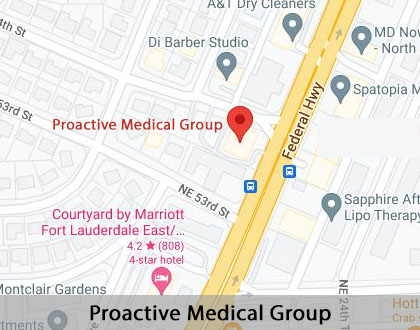Erectile Dysfunction Treatment Fort Lauderdale, FL
Erectile dysfunction (ED) is a common condition that can affect the ability to maintain an erection and a man's self-confidence. Some cases are situational and short-term, while others have underlying health conditions that contribute to long-term symptoms. Appropriate medical treatment can reverse many forms of ED.
ED often affects both sexual partners. However, couples can take advantage of therapy to find support and restore sexual satisfaction. Patients can also talk to their healthcare providers to understand the possible causes and decide which treatments will likely be most effective.
Get answers to questions about erectile dysfunction at Proactive Medical Group in Fort Lauderdale and the surrounding area. Call us at (954) 938-2843 to schedule an appointment.
What Is Erectile Dysfunction?
Erectile dysfunction (ED) is the incapability of getting or maintaining an erection that allows for sexual intercourse. An erection results from increased blood flow to the penis, and ED interrupts this process. Another term for ED is impotence, but it has become less commonly used.
ED is a prevalent condition among many men. ED is chronic if it has an underlying medical ailment, but it can also be situational or temporary. For example, some men are affected by persistent stress or medications that can interfere with getting an erection. However, men who have consistent ED might need to seek professional help.
“Erectile dysfunction (ED) is a prevalent condition among many men.”
Signs and Causes of Erectile Dysfunction
ED can manifest differently depending on the patient. For example, some have trouble achieving an erection, while others achieve one but cannot maintain it. Other men with ED have little or no interest in sex. In addition, ED can get linked to other sex-related conditions, such as delayed or premature ejaculation or anorgasmia, which is difficulty reaching orgasm after sufficient stimulation.
Causes of ED can vary depending on medical history, routines, and circumstances. Some cases have a situational factor, such as only achieving an erection during masturbation. Performance pressure and general anxiety can also fuel situational ED.
Temporary ED often stems from a behavioral choice or circumstance. For instance, smoking, unhealthy eating, and obesity can cause inflammation in the blood vessels, essential in blood flow to the penis. In some men, ongoing stress might be to blame because it increases epinephrine, causing blood vessels and muscles to constrict instead of relax. Making a few lifestyle changes or dealing with the source of stress can help address ED.
Long-term ED is generally more difficult to reverse because it often comes from a chronic medical condition like diabetes, multiple sclerosis, or spinal cord injury. The effects of some depression or blood pressure medicines could also contribute to long-term ED if taken for an extensive period. Other causes of persistent ED include:
- Nerve damage
- Parkinson’s disease
- Penile tissue damage
- Peyronie’s disease
“Causes of ED can vary depending on medical history, daily routines, and circumstances.”
Benefits of Professional Treatment
Some men find it difficult to seek medical help for erectile dysfunction. To avoid embarrassment, they might try home-based remedies, which do not address the cause of ED, are ineffective, and lead to more harm. Also, relying on lifestyle changes alone can yield minimal or no results.
Patients might want to experiment with herbal substances they see in grocery stores or online. However, many natural ED remedies are not regulated or scientifically tested, and they do not list all their ingredients. Some can even produce serious side effects, especially when combined with other medications. Patients who want to try a supplement should consult their provider first.
“Many home-based remedies for ED are not regulated or scientifically tested, and they do not list all their ingredients.”
Check out what others are saying about our primary care physician services on Yelp: Erectile Dysfunction Treatment in Fort Lauderdale, FL
Possible Treatment Options
Erectile dysfunction can often improve with proper medical care. Patients can seek advice from their provider on making lifestyle or behavioral changes, such as:
- Eating a healthier diet
- Getting more exercise
- Limiting alcohol consumption
- Managing stress
- Stopping smoking
Psychological therapy can help patients address mental health issues underlying ED. Sex therapy is a specific type of counseling that helps patients get at the root of sexual problems. Also, ED can affect both partners, and couples therapy can provide support and shed light on sexual issues.
In cases of long-term ED, medical intervention is often necessary. Several treatment options are available, including oral medication, penile suppositories, or self-injections. Testosterone replacement therapy can help men with hormonal imbalances. However, some drugs and treatments have side effects, and patients might need to try different medications before they find ones that work.
Patients who do not respond to medicines might consider vascular surgery, which repairs blocked arteries and restores blood flow. Another surgical option is the implant, such as a penile or prosthesis implant, which a patient adjusts manually into position during sex. An inflatable implant allows for pumping up the penis until it is erect.
“Several treatment options are available, including oral medication, penile suppositories, or self-injections.”
Questions Answered on This Page
Q. What is erectile dysfunction?
Q. What can cause erectile dysfunction?
Q. Can someone with ED rely on home treatments instead of seeking medical help?
Q. What different treatments are available for erectile dysfunction?
Q. What steps should a patient take after surgery to treat erectile dysfunction?
People Also Ask
Q. What are some of the most common conditions treated by a primary care provider?
Follow-Up Care
Patients who undergo surgical implantation need to follow their providers' aftercare instructions to facilitate healing. After a penile implant, the patient will usually need one or two weeks to recover. However, they can typically switch from prescription to over-the-counter pain relievers after the first week.
Patients should follow instructions on physical activities to avoid for the first month and how to operate the implant. Most men can resume sex by the eighth week after surgery. However, if swelling and pain do not disappear after a few weeks or an infection develops, the impact might need removal.
“Patients who undergo surgical treatment or implantation need to follow aftercare instructions to facilitate healing.”
Frequently Asked Questions
Q. Is erectile dysfunction preventable?
A. Given the risk factors associated with ED, reducing the risks can lower the likelihood of developing the condition. Losing weight, avoiding smoking, being physically active, and watching blood pressure and cholesterol can help. Patients can consult with their provider for more information on what causes ED and how to prevent it.
Q. Is there a cure for erectile dysfunction?
A. Some cases of ED that have underlying issues, such as lifestyle or medication side effects, can be reversed. Prescription medications and some surgeries might also provide a cure. However, other drugs might alleviate ED symptoms but not completely cure the condition to blame.
Q. Does erectile dysfunction happen only to older men?
A. ED can affect both young and older men. However, ED does become more prevalent with age, although it tends to decrease in older men. Also, age is often the factor most strongly correlated with the condition.
Q. What can a partner do to help and support someone with erectile dysfunction?
A. ED can cause stress, strain, and uncertainty for both sexual partners. As a result, many healthcare providers treat it as a shared condition. Couples therapy can help both partners better understand this disorder and equip them with ways to derive more romantic and sexual satisfaction.
Q. How is erectile dysfunction diagnosed?
A. A physical examination and medical history are often all that is necessary for an erectile dysfunction diagnosis. However, if we suspect you may also have chronic health conditions or an underlying condition, then further tests or a consultation with a specialist may be necessary. Such tests may include another physical examination, blood tests, urinalysis, ultrasound, or a psychological exam.
Start Feeling Better – Visit Us Today
By visiting us as soon as possible, our team can help get you the professional treatment you need. Instead of waiting around and allowing the symptoms to get worse, we can provide you with treatment options.
Definition of Medical Terminology
Learn More about Erectile Dysfunction
Although not life-threatening, erectile dysfunction can cause frustration and lower self-esteem. ED can stem from situational, psychological, or behavioral factors. It can also have an underlying medical cause, making it chronic. Proper medical treatment often marks the most effective way to identify the causes and reduce the symptoms.
Contact Proactive Medical Group in Fort Lauderdale to learn more information about erectile dysfunction. Call us at 954-938-2843 to schedule an appointment.
Helpful Related Links
- American Journal of Medicine. American Journal of Medicine. 2023
- American Medical Association (AMA). American Medical Association (AMA). 2023
- National Council on Aging. National Council on Aging. 2023
- The AAP Parenting Website. The AAP Parenting Website. 2023
About our business and website security
- Proactive Medical Group was established in 2022.
- We accept the following payment methods: American Express, Cash, Check, Discover, MasterCard, and Visa
- We serve patients from the following counties: Broward County
- We serve patients from the following cities: Fort Lauderdale, Oakland Park, Wilton Manors, Pompano Beach, and Sea Ranch Lakes
- Norton Safe Web. View Details
- Trend Micro Site Safety Center. View Details
Back to top of Erectile Dysfunction Treatment










